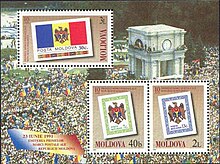Independence of Moldova
This article needs additional citations for verification. (March 2011) |
 |
|---|
|
|
| Administrative divisions |
|
|
The independence of Moldova was officially recognized on 2 March 1992, when Moldova gained membership of the United Nations. The nation had declared its independence from the Soviet Union on 27 August 1991, and was a co-founder of the post-Soviet Commonwealth of Independent States. Moldova became fully independent from the Soviet Union that December, and joined the United Nations three months later.
Background

In the new political conditions created after 1985 by the
The
Declaration of Independence of Moldova
The
The Republic of Moldova gained official recognition of statehood on 2 March 1992, when gaining membership of the United Nations.
Disputed status of Transnistria

The Moldovan Declaration of Independence clearly and directly claims Moldovan sovereignty over the territory of Transnistria as it is "a component part of the historical and ethnic territory of our people". However, the Moldovan Declaration of Independence is itself used as an argument against Moldovan sovereignty over Transnistria as it denounces the agreement of 23 August 1939, between the government of the Soviet Union and the government of Nazi Germany, the only formal mention of the union between the two territories, "null and void" .[4]
See also
- Disputed status of Transnistria
- Transnistrian Declaration of Independence
Notes
- ^ a b c d (in Romanian) Horia C. Matei, "State lumii. Enciclopedie de istorie." Meronia, București, 2006, p. 292-294
- ^ "Romanian Nationalism in the Republic of Moldova Archived 2007-09-27 at the Wayback Machine" by Andrei Panici, American University in Bulgaria, 2002; pages 40 and 41
- ^ Legea cu privire la functionarea limbilor vorbite pe teritoriul RSS Moldovenesti Nr.3465-XI din 01.09.89 Vestile nr.9/217, 1989 Archived 2006-02-19 at the Wayback Machine (Law regarding the usage of languages spoken on the territory of the Republic of Moldova): "Moldavian SSR supports the desire of the Moldovans that live across the borders of the Republic, and considering the existing linguistic Moldo-Romanian identity — of the Romanians that live on the territory of the USSR, of doing their studies and satisfying their cultural needs in their native language."
- ^ Tiraspol Times; Former ASSR Pridnestrovie reminds Moldova: "You yourself denounced our union"

